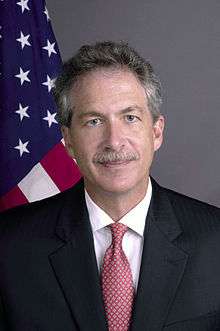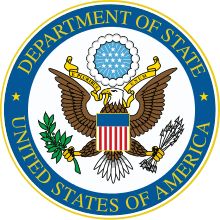William Joseph Burns
| Bill Burns | |
|---|---|
 | |
| 17th United States Deputy Secretary of State | |
|
In office July 28, 2011 – November 3, 2014 | |
| President | Barack Obama |
| Preceded by | Jim Steinberg |
| Succeeded by | Wendy Sherman (Acting) |
| United States Secretary of State Acting | |
|
In office January 20, 2009 – January 21, 2009 | |
| President | Barack Obama |
| Preceded by | Condoleezza Rice |
| Succeeded by | Hillary Clinton |
| Under Secretary of State for Political Affairs | |
|
In office May 13, 2008 – July 28, 2011 | |
| President |
George W. Bush Barack Obama |
| Preceded by | Nick Burns |
| Succeeded by | Thomas A. Shannon, Jr. (Acting) |
| United States Ambassador to Russia | |
|
In office November 8, 2005 – May 13, 2008 | |
| President | George W. Bush |
| Preceded by | Alexander Vershbow |
| Succeeded by | John Beyrle |
| Assistant Secretary of State for Near Eastern Affairs | |
|
In office June 4, 2001 – March 2, 2005 | |
| President | George W. Bush |
| Preceded by | Edward S. Walker Jr. |
| Succeeded by | David Welch |
| United States Ambassador to Jordan | |
|
In office August 9, 1998 – June 4, 2001 | |
| President |
Bill Clinton George W. Bush |
| Preceded by | Wesley Egan |
| Succeeded by | Edward Gnehm |
| Executive Secretary of the United States Department of State | |
|
In office January 16, 1996 – February 27, 1998 | |
| President | Bill Clinton |
| Preceded by | Kenneth C. Brill |
| Succeeded by | Kristie Kenney |
| Personal details | |
| Born |
April 4, 1956 Fort Bragg, North Carolina, U.S. |
| Spouse(s) | Lisa Carty |
| Children | 2 |
| Alma mater |
La Salle University St John's College, Oxford |
William Joseph "Bill" Burns (born April 11, 1956) is a former career Foreign Service Officer,[1] and President of the Carnegie Endowment for International Peace since February 2015.[2] Previously, he was Ambassador of the United States to the Russian Federation from 2005 until 2008, Under Secretary of State for Political Affairs from 2008 to 2011, and United States Deputy Secretary of State from 2011 to 2014.
Early life and education
Born at Fort Bragg, North Carolina, Burns earned a B.A. in History from La Salle University, Philadelphia, Pennsylvania, and M.Phil and D.Phil degrees in International Relations from Oxford University, United Kingdom, where he studied as a Marshall Scholar. His dissertation was expanded and published in 1985 as Economic Aid and American Policy Toward Egypt, 1955–1981.
Career
U.S. Foreign Service
Ambassador Burns entered the Foreign Service in 1982, and served as Deputy Secretary of State from 2011 until 2014. Previously, he served as Under Secretary for Political Affairs from 2008 until 2011. He was U.S. Ambassador to Russia from 2005 until 2008, Assistant Secretary of State for Near Eastern Affairs from 2001 until 2005, and U.S. Ambassador to Jordan from 1998 until 2001. Before these, he was also Executive Secretary of the State Department and Special Assistant to Secretaries Warren Christopher and Madeleine Albright; Minister-Counselor for Political Affairs at the U.S. Embassy in Moscow; Acting Director and Principal Deputy Director of the State Department's Policy Planning Staff; and Special Assistant to the President and Senior Director for Near East and South Asian Affairs at the National Security Council.
Burns played a leading role in the Middle East Peace Process, the elimination of Libya’s illicit weapons program, and the secret bilateral channel with the Iranians that led to a historic interim agreement between Iran and the P5+1.,[3] and as well as in efforts to re-set relations with Russia early in the Obama Administration and in the strengthening of the strategic partnership with India. Secretary of State John Kerry lauded his "quiet, head-down, get-it-done diplomacy", stating that it had earned him the trust of both Republican and Democratic administrations; The Atlantic called him a “secret diplomatic weapon” deployed against some of the United States' thorniest foreign policy challenges.[4]
A cable Burns signed as ambassador and released by WikiLeaks[5] describing "a high society wedding in the Caucasus -- complete with massive quantities of alcohol, lumps of gold and revolver-wielding drunkards" attended by President Ramzan Kadyrov,[6] received widespread international coverage, with historian Timothy Garton Ash writing that "Burns's analyses of Russian politics are astute," with the "highly entertaining account" of the wedding "almost worthy of Evelyn Waugh."[7]
Retirement from the Foreign Service
On April 11, the State Department announced Burns would step down as Deputy Secretary of State in October 2014, after he twice delayed his retirement first at the request of Secretary John Kerry and then at the request of President Obama,
In a press statement announcing Ambassador Burns’ decision to retire, Secretary Kerry said that “Bill is a statesman cut from the same cloth, caliber, and contribution as George F. Kennan and Chip Bohlen, and he has more than earned his place on a very short list of American diplomatic legends”.[8] President Obama, in his own statement, said Ambassador Burns “has been a skilled advisor, consummate diplomat, and inspiration to generations of public servants…the country is stronger for Bill’s service”.[9]
On October 29, 2014, the Carnegie Endowment for International Peace announced that Ambassador Burns would begin his tenure as its ninth President on February 4, 2015.
Awards
Burns is the recipient of three Presidential Distinguished Service Awards and a number of Department of State awards, including three Secretary's Distinguished Service Awards, the Secretary's Career Achievement Award, the 2006 Charles E. Cobb, Jr. Ambassadorial Award for Initiative and Success in Trade Development, the 2005 Robert C. Frasure Memorial Award, and the James Clement Dunn Award. He also received the Department of Defense Award for Distinguished Public Service and the U.S. Intelligence Community Medallion. In 1994, he was named to TIME Magazine's list of the "50 Most Promising American Leaders Under Age 40", and its list of "100 Young Global Leaders". Burns holds four honorary doctoral degrees and is a member of the American Academy of Arts and Sciences.[10] He was also awarded Foreign Policy's “Diplomat of the Year” award in 2013;[11] and the Anti-Defamation League’s “Distinguished Statesman Award” (2014).[12] He is also an Honorary Fellow, St. John’s College, Oxford (from 2012).[13]
Personal life
Burns and his wife Lisa Carty have two daughters.
References
| Wikimedia Commons has media related to William Joseph Burns. |
- ↑ "NNDB Article". Retrieved 2008-03-01.
- ↑ "Ambassador William J. Burns Named Next Carnegie President". National Endowment for Democracy (NEFD). 28 October 2014. Retrieved 26 July 2016.
- ↑ Gordon, Michael (April 11, 2014). "Diplomat Who Led Secret Talks with Iran Plans to Retire". New York Times. Retrieved 30 June 2014.
- ↑ Kralev, Nicholas (April 4, 2013). "The White House's Secret Diplomatic Weapon". The Atlantic. Retrieved 30 June 2014.
- ↑ "US embassy cables: A wedding feast, the Caucasus way", 1 Dec 2010, The Guardian
- ↑ http://www.spiegel.de/international/world/wedding-in-the-caucasus-the-us-ambassador-learns-that-cognac-is-like-wine-a-732370.html
- ↑ Garton Ash, Timothy (November 28, 2010). "US Embassy Cables: A Banquet of Secrets". The Guardian. Retrieved 30 June 2014.
- ↑ "Deputy Secretary of State William J. Burns' Decision to Retire in October 2014". www.state.gov. Retrieved 30 June 2014.
- ↑ own statement "Statement by President Obama on the Retirement of Deputy Secretary of State William J. Burns" Check
|url=value (help). Retrieved 30 June 2014. - ↑ http://carnegieendowment.org/experts/1014
- ↑ "Bill Burns Honored as Diplomat of the Year". foreignpolicy.com. Foreign Policy. Retrieved 30 June 2014.
- ↑ "Deputy Secretary of State Bill Burns Presented with ADL Award". www.adl.org. Retrieved 30 June 2014.
- ↑ "RAI in America". www.rai.ox.ac.uk. Retrieved 30 June 2014.
External links
- Appearances on C-SPAN
- "Biography of William J. Burns". United States Department of State. Retrieved 2010-12-08.
- United States Embassy in Moscow: Biography of the Ambassador
- "Американские послы в России и СССР" [U.S. Ambassador to Russia and the USSR]. Retrieved 2010-12-08.
